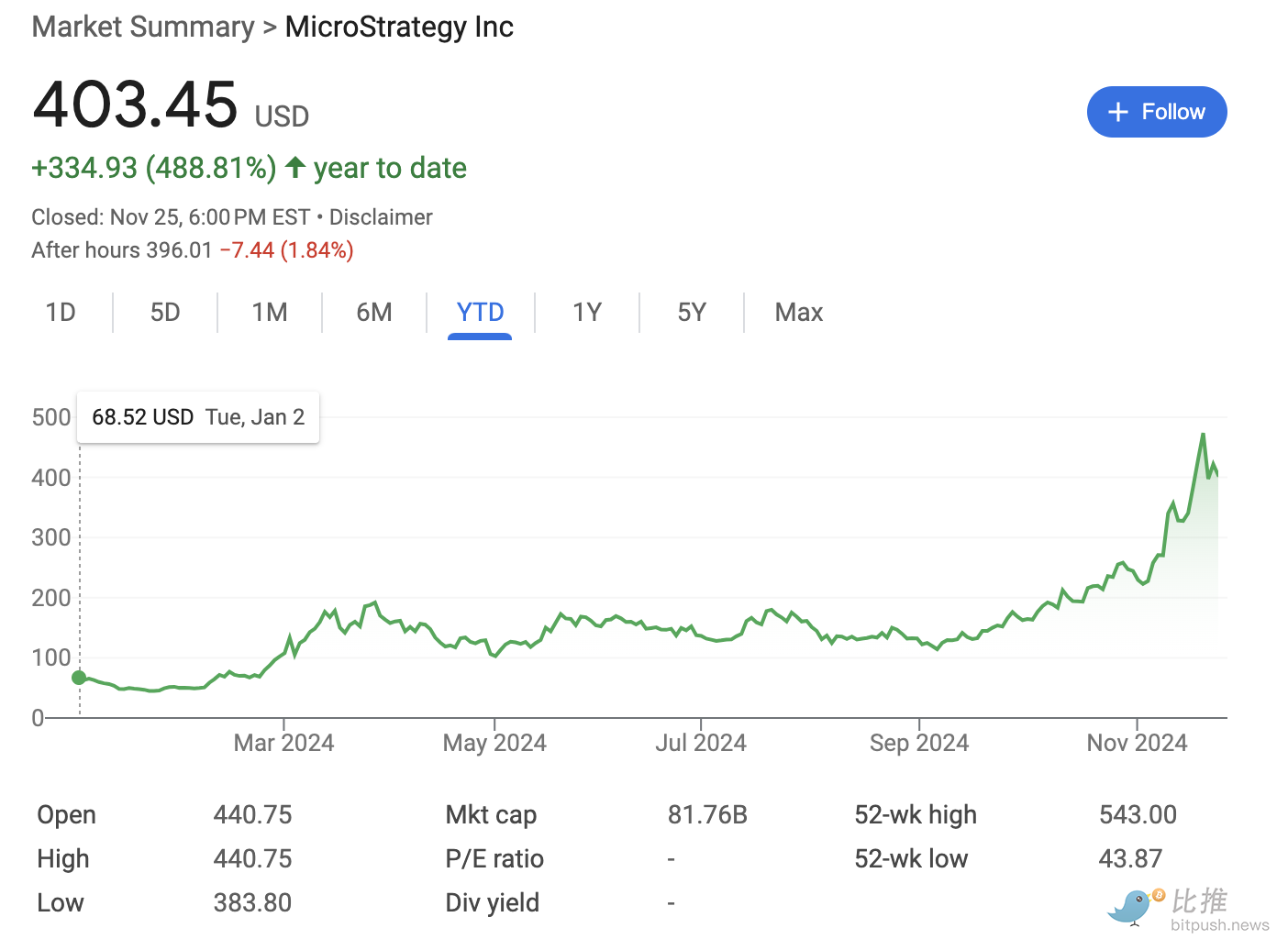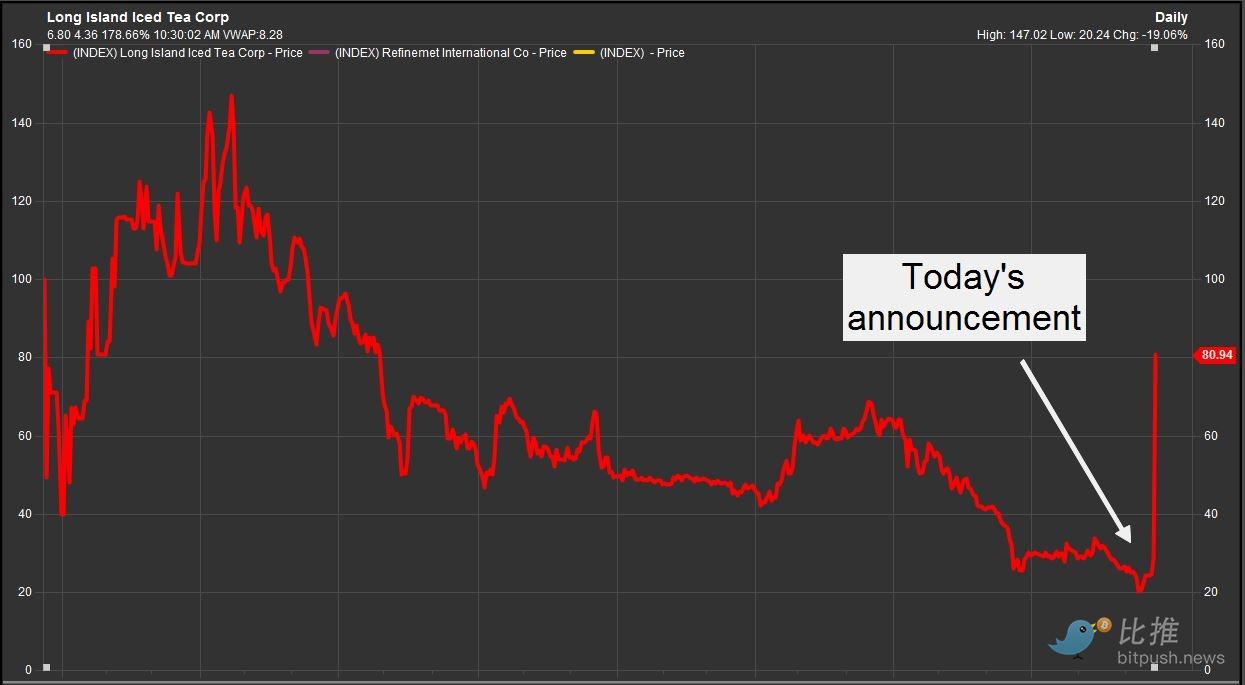Author: Aoyon Ashraf, Nick Baker
Compiled by: Bitpush BitpushNews
Abstract:
Following the success of MicroStrategy's Bitcoin hoarding strategy, many companies (some small-caps and companies unrelated to cryptocurrencies) have started announcing similar initiatives.
This strategy has led to a sharp short-term rise in the stock prices of some of these companies, but the long-term sustainability remains uncertain, according to market observers.
Although optimists believe this is a step towards more mainstream Bitcoin adoption, skeptics believe this is just a short-term hype by some small companies.
Text:
Fitness equipment manufacturers, biopharmaceutical companies, battery material producers... What do these diverse companies have in common?
Of course, it's Bitcoin.
With BTC soaring to unprecedented levels this month, at least 12 previously crypto-unrelated listed companies have announced that they plan to purchase Bitcoin (BTC) as a store of their idle cash - which has been quite profitable lately. This is the path illuminated by Michael Saylor's "laser eyes" since 2020, when he began transforming his obscure software maker MicroStrategy into a Bitcoin vault.

This has brought MicroStrategy tremendous success in the US stock market - its value has increased about 30-fold since Saylor began buying Bitcoin for the company, amassing a massive reserve worth about $38 billion as of the time of writing.
Just this month, the company's stock price has nearly doubled since Donald Trump promised to embrace cryptocurrencies and was elected US president. (Other crypto stocks have also seen a rise. Coinbase, the exchange operator, has risen nearly 70% since the day before the election.)

Other companies are trying to replicate this success.
On Friday, a biotech company Anixa Biosciences (ANIX) said its board had approved the purchase of a certain amount of Bitcoin to diversify the company's cash reserves. The stock briefly rose 19% but closed up only 5%. Meanwhile, fitness equipment company Interactive Strength (TRNR) said on Thursday that after its board approved the use of cryptocurrencies as a treasury reserve asset, the company plans to purchase up to $5 million worth of Bitcoin. The news sent the company's stock soaring more than 80% at one point, but it ended the day up "only" 11%.
Earlier last week, biopharmaceutical company Hoth Therapeutics (HOTH) announced a $1 million Bitcoin purchase plan, triggering a surge of up to 25% in its stock price - though nearly all of the gains were wiped out by the close. Similarly, companies including LQR House (LQR), Cosmos Health (COSM), Nano Labs (NA), Gaxos (GXAI), Solidion Technology (STI) and Genius Group (GNS) saw their stocks briefly spike after announcing Bitcoin treasury plans in November. Only one company, Acurx Pharma (ACXP), fell after announcing this news.
"The recent Bitcoin frenzy, combined with MicroStrategy's over 500% stock price surge in 2024, has sparked a wave of companies (especially small-caps) announcing Bitcoin purchase strategies," said Youwei Yang, chief economist at BIT Mining (BTCM).
Whether these MicroStrategy imitators will achieve the same success as Saylor remains to be seen.
Youwei Yang said, "This behavior may end in the same way as [the previous bull market]: unsustainable hype, followed by a significant correction, as the market realizes that many of these announcements lack substance."
Additionally, it is unknown whether the latest entrants will stick it out, even technically. So far, only AI company Genius Group is known to have actually purchased Bitcoin.
But who can blame them?
Early investors in MicroStrategy have already reaped huge rewards, and even recent investors have been able to easily profit. Saylor has primarily raised funds through stock and bond issuances to finance Bitcoin purchases. These imitators may have gained access to capital markets that they otherwise could not have.
The market follows the old adage of "never fight the market," regardless of the fundamentals, and just go with the flow. Businesses want to meet market demand, and no one wants to be the one telling the boss and shareholders that their performance suffered for not following MicroStrategy's lead.
"Just a few years ago, buying Bitcoin was almost too risky. However, the risk now seems increasingly the opposite - not buying is the real risk," said Brian D. Evans, CEO and founder of BDE Ventures, adding, "Not touching Bitcoin is really painful."
For the hopeful, this sudden corporate scramble may signal the long-awaited mainstream adoption of Bitcoin, especially against the backdrop of President-elect Trump expressing a desire for the US government to also hoard Bitcoin.
"For BTC supporters, expected inflation and other macroeconomic factors, as well as a more regulatory-friendly environment, are expected to drive more companies to add this asset to their balance sheets," Toronto-based crypto platform FRNT Financial said in a report.
Additionally, Bitcoin purchase strategies can open up capital markets for companies, just as MicroStrategy and miner MARA Digital (MARA) have done. Both have recently been able to raise funds through convertible bonds that do not pay interest to investors, meaning these investors are willing to forgo current income in exchange for the ability to eventually convert the debt into equity, gaining Bitcoin exposure.
BDE's Evans said that announcing plans to buy Bitcoin "is a useful way for companies to raise capital, no different from what MicroStrategy has done over the past few years."
However, for some, this sounds like a replay of the late 2010s fad, when many companies unrelated to cryptocurrencies added "blockchain" to their names.
The most famous example is the obscure beverage maker Long Island Iced Tea, which renamed itself Long Blockchain, at least initially to explosive effect: its stock price nearly doubled in a single day after the crypto-currency rebrand. The gains were not sustained, and the stock was later delisted from Nasdaq. (Three people were charged by the SEC with insider trading.)

There were other "magic" words. In the 2021 crypto bull market, many large companies have been waving the flags of "Web3," "Metaverse," and "Non-Fungible Token," trying to drive up their stock prices. Even Facebook changed its name to Meta, betting heavily on the Metaverse. However, these efforts ultimately led to massive losses.
Meanwhile, some low-performing companies unrelated to cryptocurrencies also began venturing into Bitcoin mining, which was seen as a lucrative business at the time. However, the subsequent brutal bear market has caused these once-promising crypto concepts to fall from grace, becoming "pariahs."
Youwei Yang said that while MicroStrategy has been able to raise billions of dollars from the capital markets to fund Bitcoin purchases, if others adopt this strategy, it could have an adverse impact on small companies. "For small-caps, it may be seen as a short-term gimmick, deterring serious investors. If Bitcoin's price stabilizes or declines, the speculative appeal of these stocks may wane, making these companies vulnerable to investor skepticism and regulatory scrutiny."
Wave Digital Assets co-founder and CEO David Siemer also expressed the same view, saying: "While this approach may bring short-term gains in a bull market, it also carries significant risks. Unlike direct holding of assets, leverage can amplify potential losses during market adjustments, highlighting its inherent dangers," he pointed out that some companies are using the hype around to increase debt on their balance sheets.
Regardless of who is right, after Trump won the US election, has repeatedly hit new highs, and the magic still exists: announce a plan similar to Saylor's, and then see if your stock can take off.
"We seem to be at a point where many companies feel they have to do this," said Brian D. Evans, founder of BDE.
In any case, welcome to the new bull market.






